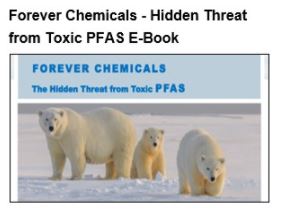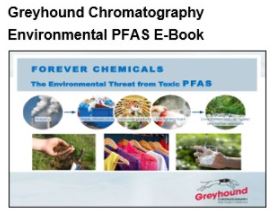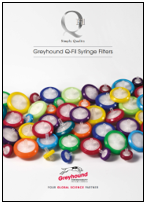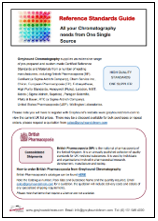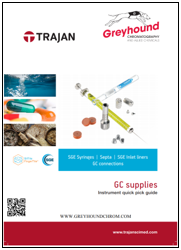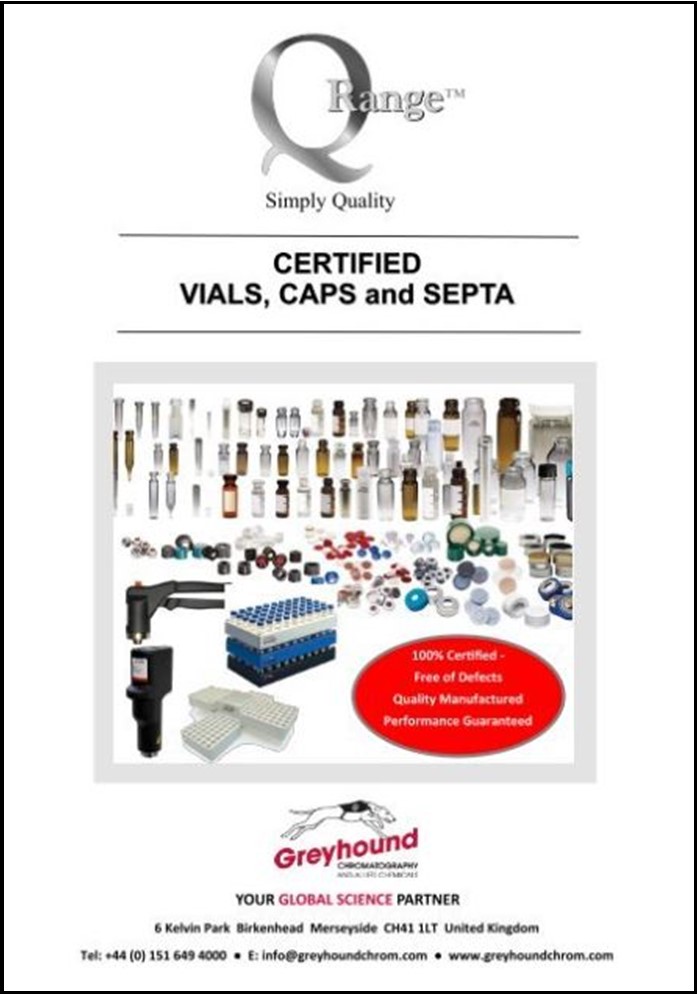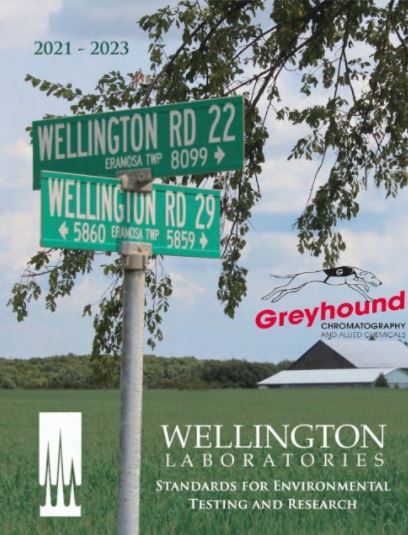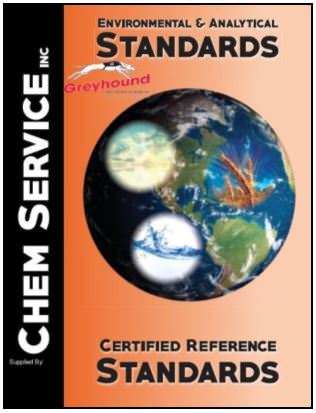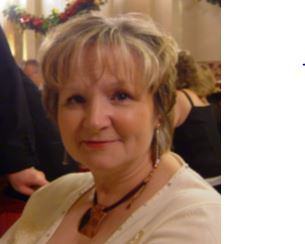Perfluoro-1-hexanesulfonamide - 1.2 ml x 50ug/ml in isopropanol - Cas # 50598-28-2
Aqueous Film-Forming Foam PFAS
In response to ever increasing reports of novel zwitterionic and cationic PFAS contaminants being found at sites exposed to aqueous film-forming foams (AFFFs), Wellington has expanded our PFAS product line to include three zwitterionic AFFF compounds, N-AP-FHxSA, N-TAmP-FHxSA, and N-CMAmP-6:2FOSA (which is commonly referred to as 6:2FTAB in the scientific literature), as well as neutral compounds also detected at impacted sites (FHxSA-I and FBSA-I).
Latest Environmental News
Denmark just became the first country to ban PFAS from food packaging
Denmark will be the first country to ban PFAS Chemicals, which have been linked to cancer, elevated cholesterol and decreased fertility, from food packaging, starting next year.
PFAS substances, sometimes called "forever chemicals" because they don't break down in the environment, are used to repel grease and water in packaging for fatty and moist foods such as burgers and cakes.
What are PFAS chemicals, and what are they doing to our health?
"I do not want to accept the risk of harmful fluorinated substances (PFAS) migrating from the packaging and into our food. These substances represent such a health problem that we can no longer wait for the EU," Denmark's Food Minister Mogens Jensen said in a statement Monday.
PFAS chemicals are a family of potentially thousands of synthetic chemicals that are extremely persistent in the environment and in our bodies. PFAS is short for perfluoroalky and polyfluoroalkyl substances, and includes chemicals known as PFOS, PFOA and GenX.
They are all identified by signature elemental bonds of fluorine and carbon, which are extremely strong and what make it so difficult for these chemicals to disintegrate in the environment or in our bodies.
Under Denmark's new regulation, baking paper and microwave popcorn bags, for example, will be required to be manufactured without any PFAS.
"We congratulate Denmark on leading the way for healthier food and hope this will encourage similar action across the EU, the US and worldwide," said Arlene Blum of the Green Science Policy Institute and the Department of Chemistry at University of California, Berkeley.
FDA confirms PFAS chemicals are in the US food supply
"Given the potential for harm, we must ask if the convenience of water and grease resistance is worth risking our health," Blum said.
PFAS chemicals have been manufactured since the 1940s and can be found in Teflon nonstick products, stains and water repellants, paints, cleaning products, food packaging and firefighting foams.
These chemicals can easily migrate into the air, dust, food, soil and water. People can also be exposed to them through food packaging and industrial exposure.
A growing body of science has found that there are potential adverse health impacts associated with PFAS exposure, including liver damage, thyroid disease, decreased fertility, high cholesterol, obesity, hormone suppression and cancer.
In a statement, the Danish Veterinary and Food Administration said that the substances were very difficult to break down in the environment, and some of them accumulate in humans and animals.
The ban covers the use of PFAS compounds in food contact materials of cardboard and paper. The Danish government said it would continue to be possible to use recycled paper and paper for food packaging, but said PFAS compounds must be separated from the food with a barrier which ensures that they don't migrate into the food.
PFOS and PFOA are the two most-studied PFAS chemicals and have been identified as contaminants of emerging concern by the US Environmental Protection Agency.
PFOS was voluntarily phased out of production in the United States by 3M, the main manufacturer, starting in 2000. In 2006, PFOA began to be phased out as well. PFOA and PFOS are no longer manufactured or imported in the United States, but similar "replacement chemicals for PFOA and PFOS such as GenX, may be just as persistent," Susan M. Pinney, a professor in the Department of Environmental Health at the University of Cincinnati.
The European Food Safety Agency said it is reassessing the risks PFAS pose to human health and will report on its findings in the near future.
Wellington Laboratories offer a wide range of Certified Reference Standards for Testing and Analysis of Perfluorinated Compounds.
Perfluorinated Compounds (PFCs)
Per- and Polyfluoroalkyl Substances (PFAS) are an emerging class of environmental contaminants. Their unique properties create a host of analytical challenges that require the use of native and mass-labelled standards for the generation of accurate data.
The most notable PFAS include PFOS (perfluorooctanesulfonate) and PFOA (perfluorooctanoic acid) and Wellington currently offers multiple mass-labelled standards for these compounds to meet your analytical needs. In fact, Wellington offers a large selection of native and mass-labelled per- and poly-fluorinated compounds, including:
- Perfluoroalkylcarboxylic Acids (PFCAs)
- Perfluoroalkylsulfonates (PFASs)
- Perfluorooctanesulfonamides (FOSAs)
- Perfluorooctanesulfonamidoethanols (FOSEs)
- Perfluorooctanesulfonamidoacetic acids (FOSAAs)
- Telomer Alcohols (FTOHs)
- Telomer Acids (FTAs)
- Telomer Sulfonates (FTSs)
- Perfluoroalkylphosphonic acids (PFAPAs)
- Perfluoroalkylphosphinic acids (PFPi’s)
- …and more
These solutions can be found on pages 141 – 159 of Wellington Laboratories’ current catalogue.
Progress and Developments from Wellington Laboratories in 2019/2020
- New PFAS Mixtures and Solutions
About Wellington Laboratories
For over 40 years Wellington Laboratories Inc. has been internationally recognised as a trusted source of high quality reference standard solutions for use in environmental/analytical testing and toxicological research. Wellington Laboratories offers an extensive inventory of individual certified reference standards and solution mixtures of native and mass-labelled halogenated organic compounds including polychlorinated dibenzo-p-dioxins, polychlorinated dibenzofurans, polychlorinated biphenyls, halogenated flame retardants and perfluorinated compounds. Wellington Laboratories also offer a variety of calibration sets and support solutions designed to be used for common regulatory methods or modified in-house methods.
Wellington’s Reference Standards are used mainly in Environmental/analytical testing and toxicological research. Wellington offers an extensive inventory of individual certified reference standards and solution mixtures of native and mass-labelled halogenated organic compounds including polychlorinated dibenzo-p-dioxins, polychlorinated dibenzofurans, polychlorinated biphenyls, halogenated flame retardants and perfluoronated compounds. Wellington also offer a variety of calibration sets and support solutions designed to be used for common regulatory methods of modified in-house methods.
Wellington Laboratories are committed to the distribution of quality products as well as the maintenance of excellent customer service. In fact, in order to provide your customers with the best possible service, Wellington have three ISO certifications (ISO 9001:2008, ISO/IEC 17025:2005, and ISO Guide 34:2009) which cover all aspects of planning, production, testing, distribution, and post-distribution service. These certifications allow Wellington Laboratories to monitor and maintain the highest level of quality and service and also allow their customers to satisfy the requirements of their own ISO certifications.
Wellington’s ISO/IEC 17025:2005 accreditation has been certified by the Canadian Association for Laboratory Accreditation Inc. (CALA) the scope is available for review on the CALA Directory of Accredited Laboratories (http://www.cala.ca).
Similarly, Wellington’s ISO Guide 34:2009 accreditation has been certified by ANSI-ASQ National Accreditation Board (ANAB), the certificate and scope are available on their website (http://anab.org/).
We are able to supply hard copies of any of the ISO certificates for yourself and your customers.
Full Range of Wellington Laboratories' Products
CONTACT US
Tel: +44 (0) 151 649 4000
Email: marketing@greyhoundchrom.com
FOLLOW US
YOU MAY ALSO BE INTERESTED IN OUR NEWSLETTER
About the Author
Susan Massie, Sales & Marketing Director, Greyhound Chromatography and Allied Chemicals Email: sue@greyhoundchrom.com
Susan Massie is the Sales & Marketing Director for Greyhound Chromatography and Allied Chemicals, affectionately known as 'Greyhound' in our scientific community. Greyhound was founded by Susan's husband Paul Massie more than 40 years ago, Susan hasn't been in the business for all of that time but has been involved with Greyhound for over 17 years. Greyhound continues to grow, expanding into new markets and taking on the challenges of our ever changing environment. It's heartwarming to witness the world waking up to the fact that we are damaging our planet on a daily basis. Every action we take has a direct effect on our planet and the world we leave behind for future generations. Susan is passionate about climate change and is happy to work in an industry that can have a direct effect on reducing the impact of our actions on the environment. All of the team at Greyhound take our responsibilities very seriously, the products that we supply are used by the world's leading scientists and chemists as they endeavour to monitor and repair the environment. All is not lost, if we all take responsibility for our actions, from reducing our waste and reusing or recycling our material collateral we can make a difference. The internet is full of useful advice and guidance, Susan is proud to contribute to that wealth of knowledge whenever she can.
Greyhound prides itself on personal service which provides prompt, efficient, cost-effective, safe delivery of all products. Greyhound provides technical advice and distribution of Certified Reference Standards and Materials, Laboratory Consumables, Solvents and Reagents across all scientific disciplines. Greyhound Chromatography offers over 1 Million products from its UK warehouse. The team at Greyhound are proud to support the work of the world's leading scientists and chemists as they challenge the abuse of our planet and try to make a difference to the world we leave behind for our ancestors.
You can view Susan's Linked In Profile here https://www.linkedin.com/in/susan-massie-79ab4121/



